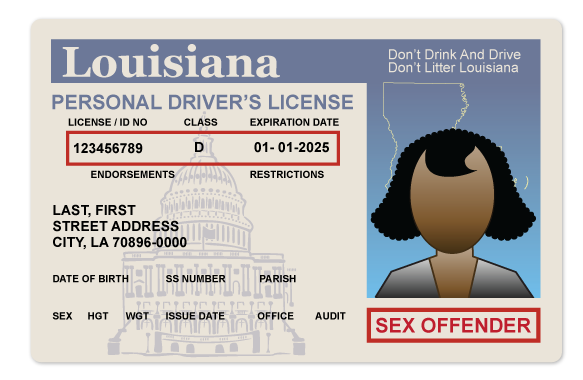At a Glance
Date Filed:
Current Status
On March 29, 2012, the court found the registration requirement unconstitutional and ordered the removal of the individual plaintiffs. On June 10, 2013, Louisiana agreed to remove from the sex offender registry the nearly 900 people registered solely because of a CANS conviction.
Co-Counsel
Stuart H. Smith Law Clinic & Center for Social Justice, Loyola University New Orleans College of Law; Andrea Ritchie; Cleary Gottlieb Steen & Hamilton LLP (Jindal). Stuart H. Smith Law Clinic & Center for Social Justice, Loyola University New Orleans College of Law; Andrea Ritchie; Kairys, Rudovsky, Messing & Feinberg, LLP (Caldwell).
Case Description
In Louisiana, people accused of soliciting sex for a fee can be criminally charged in two ways: either under the prostitution statute or under the solicitation provision of the Crime Against Nature statute. This archaic statute, adopted in 1805, outlaws “unnatural carnal copulation,” which has been defined by Louisiana courts as oral and anal, but not vaginal, sex. Police and prosecutors have unfettered discretion in deciding whether to charge someone with prostitution or Crime Against Nature by Solicitation (CANS). When CCR filed suit, a CANS conviction subjected people to far harsher penalties than a prostitution conviction. Most significantly, individuals convicted of CANS were forced to register as sex offenders.
The registry law imposed many harsh requirements that impacted every aspect of our clients’ lives. For example, they were required to carry a state driver’s license or non-drivers’ identification document which branded them as a sex offender in bright orange, capital letters. Registered sex offenders are required to disclose the fact of their registration to neighbors, landlords, employers, schools, parks, community centers, and churches. The names, addresses, and photographs of registered sex offenders appear on the Internet.

Many of our clients were unable to secure work or housing as a result of their registration as sex offenders. Several were barred from homeless shelters. One was physically threatened by neighbors and another was refused residential substance abuse treatment because providers will not accept sex offenders at their facilities.
Our clients were not alone in being forced to register as sex offenders solely as a result of a CANS conviction. Indeed, at the time CCR filed suit, almost 40 percent of registered sex offenders in Orleans Parish were on the registry as a result of such a conviction; 76 percent of these were women and 80 percent were African American.
Doe v. Jindal challenged the sex offender registry requirement on behalf of nine plaintiffs. CCR argued that being forced to register as a sex offender because of a Crime Against Nature conviction violated equal protection principles. Because people convicted under the essentially identical prostitution statute were not required to register as sex offenders, we argued, there could be no legitimate purpose in forcing people convicted of CANS to do so.
On March 29, 2012, the court found the registration requirement unconstitutional and ordered the removal of the nine plaintiffs. CCR then filed a follow-up class action, Doe v. Caldwell, seeking the removal of all of the nearly 900 individuals who had been forced to register as sex offenders because of a CANS conviction, in light of the court’s ruling in Doe v. Jindal. The class action was settled on June 10, 2013, and the state removed those convicted of CANS from the sex offender registry. Meanwhile, the legislature equalized all penalties between the prostitution and CANS statutes moving forward.
CCR’s CANS litigation is part of CCR’s broader efforts to challenge sexual violence, the criminalization of LGBTQ persons, discriminatory policing, and racial injustice.
To learn more about this issue, visit our community partner Women with a Vision and its No Justice campaign.

